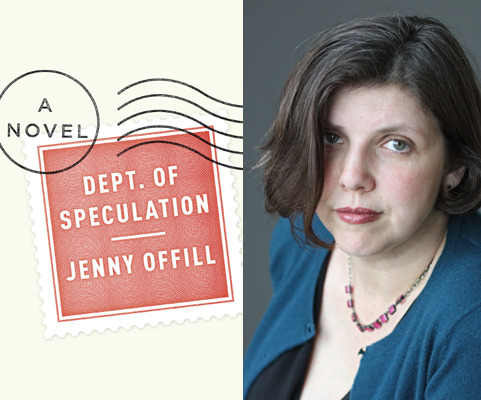Meet a NYFA Artist: Jenny Offill
NYFA talks to Jenny Offill (NYFA Fellow in Fiction, 2006) about writing at night, unhinged narrators, and her new book, Dept. of Speculation, which will be published by Knopf later this month.
NYFA will be doing a reading with Jenny at Barnes and Noble on February 18. Please visit our Events page for details.
NYFA: Congratulations on your new book, Dept. of Speculation! Let’s talk about your process of writing it and getting started. Did you have an idea about the scope of the book when you first sat down and began working on it?
JO: It took me a long time to find the right form for this book. At first, I told the story of a marriage from the point of view of a woman who had planned to be an art monster, but instead had an affair with her professor and married him. Part of the novel was also narrated by her stepdaughter. (And there was a plot about human extinction
shoehorned in, too.)
NYFA: Any surprises along the way?
JO: At a certain point, I scrapped my original idea completely and decided to write the whole novel in fragments, to echo the way the wife’s mind skips from thing to thing. I wanted the book to be about love and loneliness and art, and to contain as much as possible without any excess.
One surprise was that I began to change the POV in order to indicate how close or distant the narrator felt at any point from her husband. At first when I made these switches they seemed like inconsistencies, but eventually I realized what they meant. So in the beginning, when they are first together, she addresses him directly as “you”. After they have fallen into roles, she calls him “my husband,” and then when things fall apart, she spins off into space and speaks only of “the husband” and “the wife.” Later this reverses and the POV comes in closer again.
NYFA: How many drafts did you have for Dept. of Speculation?
JO: I don’t write drafts exactly. I tend to fiddle around a lot until I find the right structure for the book and then I go back to the beginning and proceed sentence by sentence until the end. This is a truly maddening way to write a novel and one I do not recommend. The only good thing about this method of composition is that when I reach the last page I am usually done. The revision happens along the way instead of all in one final push.
But I like to include non-fiction snippets in my books, and I have reams and reams of those left over at the end. A lot of B-list trivia about Buddhists and evolutionary biology and stoic philosophers, in this particular case.
NYFA: What are you currently working on?
JO: A novel. I would tell you what it’s about, but I never really know until I’m done.
NYFA: When and where do you like to write? Any special conditions (music or no music, food, lighting, etc.)?
JO: I like to write from midnight to dawn with great stores of candy and Red Bull laid in. I used to be able to work such hours without stimulants, but now I am old and likely to fall asleep if I skip them.
I’m not sure why I have the work habits of a 20-year-old coder, but no matter how many times I set up a more reasonable schedule, I always fall back to this. Essentially what this means is that I work in fits and starts and that there are sometimes long stretches where I don’t write much at all. But I always take notes; that never falls away. “Attention equals life or its only evidence,” Frank O’Hara said, and I believe this.
NYFA: You’ve said that you’re interested in unhinged narrators in fiction so much that you taught a class dedicated to that subject. Who are some of your favorite unhinged narrators?
JO: I always teach Humbert Humbert in Lolita and the unnamed writer starving to death in Knut Hamsun’s Hunger. Thomas Bernhard has some great unhinged narrators, as does Robert Walser. In contemporary literature, two of my favorites narrators are Money Breton in Mary Robison’s Why Did I Ever, and Doug in Donald Antrim’s The Hundred Brothers.
NYFA: What are you reading now and what do you plan on reading next?
JO: I’m reading The Smoking Diaries by Simon Gray. Next up is Traces of the Blast by Mary Ruefle.
NYFA: With two novels and three children’s books under your belt, do you have any advice for writers just starting out?
JO: Don’t take advice from people who prize security above all else.
Surround yourself with smart, funny, ridiculously broke friends and learn to tolerate uncertainty together. Cook each other dinner, loan each other rent, and banish all talk about how old you are getting, and how young everyone else is.
NYFA: You received a NYFA fellowship in Fiction in 2006. What did getting the NYFA fellowship mean to you at the time?
JO: It was the most immensely encouraging thing. It had been seven years since I’d finished my first novel and the NYFA grant made me feel that I might yet finish another one. It took the edge off my doubt and spurred me to start working seriously again. It was a turning point for me as a writer, and I am very grateful to have been given it.
— Interview conducted by Maria Villafranca
For more information, please visit Jenny’s website.



